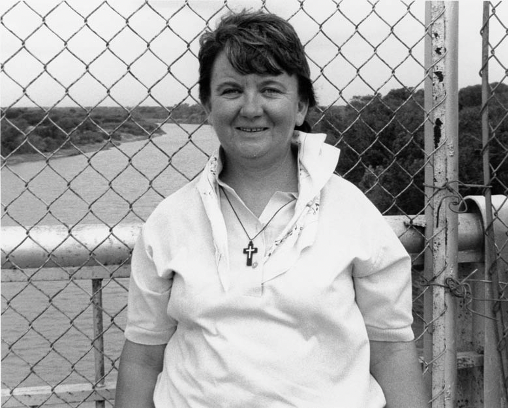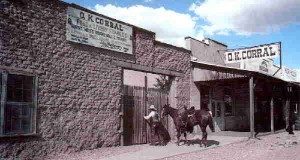After a Tetris game with the luggage, a couple of naps, and a karaoke session our group of students had finally made it to the Rio Grande Valley. Looking out the window of the twelve passenger van, palm trees flooded my view. The green leaves flew in the warm spring breeze while Taylor Swift played on the radio; the week was set for our Spring Break service immersion trip. We planned to stay at the Basilica in San Juan, TX. This holy place, was home to a mini hotel with pebbled flooring and rustic wooden frameworks that created a welcoming feeling of home. While many students who attend St Mary’s University come from Harlingen, McAllen, and Brownsville, the well known towns were not our destinations. Instead we were to embark on a journey into life of the lesser known colonias in the Rio Grande Valley.This trip just a few hours from San Antonio, took us into another dimension, one where our faith and purpose grew stronger.
So we walked into the ARISE Command Center, the rich scent of coffee brewing greeted our nostrils, and the sweet taste of pan dulce from the local panaderia made our mouths water. Every staff member hugged and cared for us as if we were their own children. I felt instantly at home. The day consisted of presentations and home visits with community members. And this is how I learned about Sister Gerrie Naughton, the founder of ARISE Adelante, but to the residents she was La Monjita en la Bicicleta. Sister Gerrie cared and loved the community so deeply that her impact can still be felt everywhere. Although I did not get to meet Sister Gerrie, the women of ARISE embodied her mission and carried it with them as they walked along the same dirt paths that Sister Gerrie rode around on her bike. So I will take you on my journey to discover Sister Gerrie’s vocation and devotion to the colonias.
Sister Gerrie Naughton, one of the Sisters of Mercy came to the Southern most part of the US, along the Texas-Mexico border in the 1980’s. Excited about this region full of life and culture, Sister Gerrie was eager to connect to her new community and to find out how she could help. Having no prior plan in place, Sister Gerrie set out on her bicycle to visit families in the community asking them what they needed most. As she ventured out further on her daily rides, she came across some dirt roads, houses built piecemeal and a sprawling community overflowing with needs. It was obvious this area lacked basic infrastructure such as proper drainage systems, clean running water, or a consistent supply of electricity. There were even days when she could not make it across a single road because it had rained the day before and every road remained flooded. Throughout her time in the Rio Grande Valley, Sister Gerrie visited with many families, many of whom had recently immigrated from Mexico. These families were looking for a way to improve their economic situation and yearning to provide for their family. When asking what they needed most she received responses ranging from English classes, to help filling out government forms, and so much more.

In response to these concerns, Sister Gerrie began a non-profit in 1989: ARISE Adelante, in Las Milpas, Texas in the heart of these colonias. They are made of a mostly immigrant population who crossed over to seek more opportunities for better lives. Just two years after she first arrived in the Rio Grande Valley, ARISE came to life with the help of five other women from the community. This non-profit organization has now grown to encompass multiple community centers that continue providing a wide variety of services and classes and other learning opportunities for all. The legacy of Sister Gerrie goes beyond the building and the 501C non-profit status. What ARISE Adelante provided was the resources and structures that the colonias were not afforded. Sister Gerries showed these families that their daily struggles mattered and that she cared to assist them.
According the Texas Attorney General Colonia Prevention Database, a colonia is defined as, “substandard housing developments, often found along the Texas-Mexico border, where residents lack basic services such as drinking water, sewage treatment, and paved roads.”1 Texas Senate Bill 827 classifies colonias into three categories: red, yellow and green based on the risk to public health. 2 The classification system ranges from red colonias lacking access to potable water, unpaved roads, no access to sewage systems, and susceptibility to flooding. Yellow colonias may have some better conditions including potable water service with approved wastewater disposable systems, however they still lack adequate paved roads, proper drainage and solid waste disposal pick up services. Green colonias have access to all of these services and pose the lowest level of risk to human health. Colonias have purposely been written out of city plans for decades with no improvement to the basic necessities despite countless initiatives launched by the State of Texas. The conditions of colonias across the Rio Grande Valley and the entire Texas-Mexico border are unacceptable. These communities have been studied for decades and little progress has been made since. 3 These conditions impact every aspect of life both directly and indirectly. Studies show significant impact on a students’ ability to excel in the classroom, residents’ compromised immune system and increased susceptibility to contagious illnesses, and overall poor mental health.4 The Universal Declaration of Human Rights also states that, “Everyone has the right to a standard of living adequate for the health and well-being of himself and of his family including food, clothing, housing and medical care…” 5 The conditions of colonias clearly violate this standard set by the United Nations in 1948.

The need for clean water in the colonias has led residents to look for inexpensive alternatives to the water from the tap. Purchasing a water filtration system is a huge expense that not many residents can afford, so they rely on molinitos. Molinitos are small refill stations, usually located at a gas station or a corner store, where one can refill five-gallon jugs.6 These jugs can weigh up to forty-five pounds and become an obstacle for a family who does not have a vehicle, a refill station near by, or simply for youths not strong enough to pick it up.7 The areas in which colonias are located are also prone to flooding, making roads inaccessible and with stagnant water that foster mosquitoes born illnesses. These waters emit unpleasant odors and can pose huge health risks for residents.8 The flooding leaves behind massive amounts of mud that residents must tread through to get to the school bus in the morning, leaving students with muddy all over their shoes and a clear indication of which side of town from where they come. 9
When Sister Gerrie Naughton arrived in the town of Las Milpas in 1987, these were the conditions she found this community in. Shortly after, she became she brought with her tremendous hope to each colonias community and became known as “la monjita en la bicicleta.”10 She listened and engaged with each community and took actions to help improve daily lives individually and collectively. The inadequacies described above posed and continue to pose severe health risks to the community members and have not been properly addressed by county officials. Sister Gerrie and the women of ARISE developed community programs to help alleviate the burdens felt by their neighbors. English lessons, information sessions to apply for residency or citizenship (depending for what one qualified), after-school and summer programs for the youth at new community centers and celebrations that glorified their culture and roots, ARISE provided a safe haven for each segment of the community. 11
Since their founding in 1989, ARISE Adelante has developed six different pillars of focus and has created community led teams to spearhead events, fundraisers, demonstrations, and petitions to advocate for and educate the community. These pillars include education, environment and health, housing and infrastructure, immigration, civic engagement and leadership, and spiritual development. 12

Each pillar has specific courses and events attached to it that are organized and executed by community members. Through these pillars, ARISE Adelante, with the leadership and direction of Sister Gerrie, has lifted their community higher than any of them could have ever imagined. The organization now has four centers across the region with over one hundred volunteers. One thing that Sister Gerrie instilled in this group was, “We will not do for the community what they can do for themselves.” Volunteers developed many self-help classes and seminars to empower its members. By advocating for better infrastructure, better schools, and providing a safe space for people of any religion, ethnicity, and income, ARISE has become a home away from home for countless individuals. The leadership, all women, has also become a model for the community. There is so much beauty in the fact that ARISE Adelante is a non-profit organization completely led by women. These women have created a support system, not only for volunteers but for all women across their communities. No matter their background, they support one another in every endeavor and bond over mutual experiences. Sister Gerrie fostered a sense of pride that had been lost.13 She expected from the community, not for perfection but excellence, because only God is perfect.
Although Sister Gerrie passed away in 2009, her legacy lives on. She serves as an inspiration to all women led organization and provided a true example of working within a community, with the community, for the community. The women of ARISE continue to follow Sister Gerrie’s lead as their beacon of hope and prosperity. Despite the great progress that has been made, the colonias of the Rio Grande Valley have sprawled on and require many further improvements. Nonprofits such as ARISE Adelante shed a much need spotlight on the disparities that exist across the region in disparate infrastructure and access to education. ARISE Adelante succeeded by mobilizing the community toward a common goal and ensuring that their voices were heard. Unfortunately, many city and county officials remain unwilling to listen. Statewide elections in recent years have also set the momentum back. By redirecting or removing funds from the Colonias Project out of Texas A&M- San Antonio, Governor Abbott has single-handedly stalled research into these communities. Alongside the lack of funding for adequate housing and infrastructure improvements such as public lighting and paved roads, community leaders must wind their ways through processes that require seventy-five percent of the original landowner’s signatures for petitions before they can come before committee for consideration. Nevertheless, the fight continues. The women of ARISE Adelante focus their daily efforts to educate their community and build from the ground up following the lead of Sister Gerrie Naughton.
- The Attorney General of Texas, “Colonias Prevention,” (2015) https://www.texasattorneygeneral.gov/divisions/colonias-prevention . ↵
- Texas Office of the Secretary of State Colonias Initiatives Program, “Tracking the Progress of State-Funded Projects that Benefit Colonias,” (2014) https://www.sos.state.tx.us/border/forms/2014-progress-legislative-report.pdf . ↵
- Mark Estes, Kingsley E. Haynes, and Jared E. Hazleton, “Colonias in the Lower Rio Grande Valley of South Texas: A Summary Report,” Policy Research Project Reports University of Texas at Austin 18 (1977). ↵
- Center for Public Policy Priorities, “State of Texas Children 2017: Child Well Being in the Rio Grande Valley,” Texas Kids Count Project October (2017). ↵
- United Nations, Universal Declaration of Human Rights, (1948), accessed October, 4, 2020, https://www.un.org/en/universal-declaration-human-rights/ . ↵
- Wendy Jepson and Heather Lee Brown, “‘If no gasoline, no water’: privatizing drinking water quality in South Texas colonias,” Environment and Planning 46(2014): 1038-1048. ↵
- Wendy Jepson and Heather Lee Brown, “‘If no gasoline, no water’: privatizing drinking water quality in South Texas colonias,” Environment and Planning 46(2014): 1038-1048. ↵
- Irma N. Ramos M.D., Marlynn May, PhD., and Kenneth S. Ramos, PhD, “Environmental Health Training of Promotoras in Colonias Along the Texas-Mexico Border,” American Journal of Public Health 91(April 2001): 568-570. ↵
- “Communities on the U.S. border ‘grow from within’,” Soli Salgado, publish June 6, 2016, https://www.globalsistersreport.org/news/ministry/communities-us-border-grow-within-40201. ↵
- “Communities on the U.S. border ‘grow from within’,” Soli Salgado, publish June 6, 2016, https://www.globalsistersreport.org/news/ministry/communities-us-border-grow-within-40201. ↵
- ARISE Adelante, accessed October, 4, 2020 http://www.arisesotex.org/ . ↵
- ARISE Adelante, accessed October, 4, 2020 http://www.arisesotex.org/new-page-5. ↵
- “Communities on the U.S. border ‘grow from within’,” Soli Salgado, published June 6, 2016, https://www.globalsistersreport.org/news/ministry/communities-us-border-grow-within-40201. ↵



65 comments
Gonzalez Elizabeth
Good evening Angela I hope all is well. This article is really admirable. One excellent illustration of how people join together and assist when there is a need in an area with few resources is Sister Gerrie Naughton of the Sisters of Mercy. Sister Naughton motivated me to get more involved in my community and be a civic leader to carry on helping others locally and globally. In 1989, Sister Gerrie founded ARISE Adelante, a non-profit organization in Las Milpas, Texas, in response to the community’s problems. This was an excellent method of helping immigrants who were traveling to the US in quest of a better life for themselves and their families. With the assistance of five other women from the neighborhood, ARISE was born, just two years after she moved to the Rio Grande Valley. With time, this non-profit organization has expanded to include other community centers that still offer a wide range of services, workshops, and other educational opportunities to everyone. The 501C non-profit status and the building are only two aspects of Sister Gerrie’s legacy. ARISE Adelante supplied the structures and resources that the colonias were unable to get. These families received support from Sister Gerries, who demonstrated her concern for them and her understanding of their everyday problems.
Emilee Luera
Such tales are both instructive and uplifting. Many communities are underprivileged and unable to help themselves, which is tragic. As demonstrated in this article, one person’s deeds can continue to benefit others even after that person’s death. I’m surprised I’d never heard of her civic achievements before. Her accomplishments and what she did will not be forgotten, as her ARISE program carries on.
Bijou Davant
I always love reading about women and how they stand up for what they believe in and doing good for their communities. Through Civiv Engagement, we learn that we must engage with our community in order to put its best foot forward. It is inspiring to know Sister Gerrie went out of her way to get first hand reports from ciztizens on what they need most and how to ensure their best lives. These conditions are not ideal and can even infringe on the lives of the whole community that will bring dispair. Luckily Sister Gerrie stood up to make sure these were changed.
Juan Aguirre Ramirez
Hey Angela, I find this article very inspiring and well writted. It’s true that sometimes the best way to create change is by starting in your own community and listening to the people around you. Sister Gerrie is a great example of someone who did just that, and she was able to make a real impact through her dedicated civic engagement. It just goes to show that anyone can make a difference if they put their mind to it!
Analyssa Garcia
Hi Angela, this was a very nice read. It is always very inspiring to read stories like this, but also very important. Sometimes the change starts from within the community by anyone willing to listen. I love that Sister Gerrie was able to lift the voices in the community and represent first hand, true and dedicated civic engagement. Good work.
Geraldine Fry
Thank you for writing about Sister Gerrie she was such an inspiration. ARISE and other programs are so important to help educate our community. I had never heard about ARISE before reading this story and that they focused on immigration. I am surprised that I had never heard about her Civil achievements before. Her legacy and achievements will not be forgotten with her ARISE program still living on.
Alexis Zepeda
I think it is articles such as these that show the true importance of community engagement. As shown in this article, one person’s efforts can continue to affect others positively even once that person is no longer living. I think this idea of how one’s efforts can go a long way is important because I feel as though it is stories like Sister Naughton’s that inspire others to put effort towards helping the community around them. I think Sister Naughton is a courageous person who was inspired to help others who could not help themselves. Overall, I enjoyed reading the article and the images included in the article. I think this article was informative and insightful.
Alexis Zepeda
I think this article is inspiring regarding community engagement and how one person’s efforts can bring about new organizations such as Arise
Daniela Garza Martinez
This is such a great read Angela! Thank you for giving the spotlight to a women led organization that had such an impact on the RGV! I’m so incredibly inspired by stories like these, where individuals take the time to aid others in their communities– even more so when people pave the way for change to happen like this.
Alejandra Pardo
Great article Angela! The article is well composed and informative. Sister Gerrie along with the others that set ground for ARISE Adelante did an amazing job. The civic engagement shown through these efforts in helping communities of the colonias throughout the Rio Grande is inspirational. They lacked many basic necessities and through ARISE I’m sure they have aided thousands of residents in their area.